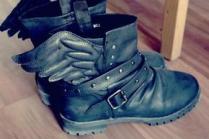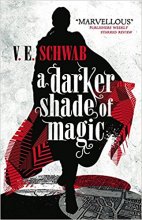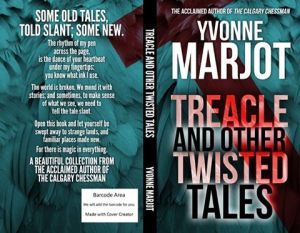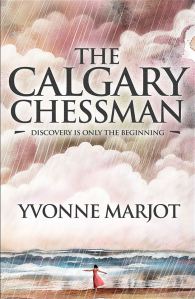
Today’s story for https://www.facebook.com/christmaswithcrookedcats is full of magic and wonder – with a modern twist.
Maryika’s Christmas
Christmas Eve, 2016.
“It’s not fair.” Andre ran from the room, slamming the door as he went. Maryika followed, more slowly. At twenty-two she should be above her brother’s adolescent rages. She agreed with him, though. It wasn’t fair.
Their mother had made it all sound so reasonable. “We have so much. All our needs are met. Christmas is just one more occasion to give each other gifts that we can give at any time of the year. And it’s such a worthy cause.”
It was. That was what made it so hard to object. Their parents’ decision to donate to the charity War Child all the money that they would usually have spent on Christmas gifts was a harsh surprise for their children. But their mother was also right: they had so much, and it wasn’t a terrible idea to give some of what they could spare to help children to go to school, or get the medicines they needed, or keep themselves warm and safe in this winter season.
Christmas was a time for giving. Of course they should give as well as receive. Even Andre had to admit it was selfish to argue otherwise. He hadn’t lost the plot until Mama had told them she had asked all their relatives to donate the money they would have spent on gifts to the charity. This Christmas no-one would be giving any gifts at all.
Which somehow made the generous gift to the charity feel like robbery. Especially to Andre. At sixteen he was still half a child, and the thought of Christmas without mounds of presents under the tree, and cupboards full of treats to raid when he thought Mama wasn’t looking – well, it wasn’t surprising he’d lost his temper.
Maryika wandered into the kitchen, where Baba was making vatrushka, one of Maryika’s favourites. “I thought there weren’t going to be any treats this year,” she said.
Baba glowered. “Simple peasant bread,” she said, folding the delicious doughy mass over and over with her hands, kneading it gently until smooth and ready to rise. Once cooked, the sweet, soft bread rolls would be perfect with stewed fruit and cream, or just as pleasurable to eat by themselves with a cup of coffee. The old lady sniffed. “Nobody told me we were not to eat,” she said, covering the rounded shapes with a muslin cloth. “No point everybody dying of hunger to save some children we don’t even know.”
“Baba!” Maryika was shocked. “There are children who can’t even go to school, or buy medicines if they have conditions like diabetes. Their families have lost everything. We’re just trying to help them as much as we can.”
Baba looked her over, black eyes shining in the heat of the kitchen. She poked Maryika in the arm and made her yelp. “I thought you didn’t like the idea?”
“It’s a good idea. There’s a real need. It’s just… I think Andre’s afraid it won’t feel like Christmas. And so am I, really.”
Baba’s face softened. “It will still feel like Christmas,” she said. “I can promise you that.”
She turned back to the stove. Maryika sat down at the table and watched her grandmother bustle around the kitchen. Upstairs there was a muffled concussion as Andre banged another door.
Baba turned back and pushed a mug across the table towards her. Maryika sipped the hot milk, smelling of nutmeg and cinnamon. It tasted like childhood. She closed her eyes, lulled by the sound of Baba’s voice. “Tonight you will dream a wonderful dream. You will be part of the miracle of Christmas.”
Maryika opened her eyes again to see Baba gazing at her, al the wrinkles of her face deepening as she smiled. “Now go talk some sense into your brother, before he knocks the whole house down in a rage.”
…
Maxim Lyotov stood at the window, looking out over the landscape but seeing nothing. Sonya was crying again. He couldn’t bear it. He had to bear it.
She had received the news yet again of her failure to conceive. It wasn’t anybody’s fault. The doctors had done their best, but for no particular reason it seemed that she could not bear a child, or he could not engender one. Their bodies produced sperm and egg as required, and the two seemed perfectly happy to merge and produce embryos, but one by one each implanted pregnancy failed.
Worst were the attempts which seemed to be working. Sonya would begin to bloom, trying all the while to deter conversation about the baby, superstitiously behaving as if talking about the pregnancy could be fatal, only for it to end in blood and pain, long before the child began to properly grow. This time had been easier – no sooner begun than ended – but she was still devastated. She was exhausted with the process, and he couldn’t stand to see her distressed any longer.
Today he’d told her that there would be no more attempts. He forbade it. They were not meant to have children, and that was an end to it. Now she was crying over his cruelty. Maxim clenched his fists in his pockets, by long habit concealing his emotions. He’d learned from experience that success came more readily to a man who seemed steady and controlled, free from passion.
He was the last, and now anonymous, prince of a tiny principality once swallowed up by the great Soviet, and now released into the grasp of one of the new countries: shaky, half-imaginary nations invented by Stalin, peopled with incompatible tribes and ethnicities, struggling to find cultural identities of their own. There was no room for princes, or titles, in the new reality.
Old blood still counted for something, though. It had got him into a good English-speaking school. He’d worked hard at the school, where the other pupils knew him as Max Winterson. They’d guessed, some of them, that he was from somewhere to the east of the European continent, but he’d never discussed his roots. ‘High born family fallen on hard times’ was a label that could have been applied to many of the boarders, and it didn’t make him stand out.
Brains and hard work had got him into Oxford, and out again, with a double first: into the diplomatic service and eventually to the post of UN Special Envoy to S___. The post was not without its rewards, including a generous salary which paid for the flat in Vienna with its floor-to-ceiling windows, and for the repair and upkeep of his family’s dacha.
Maxim peered out of the window of the dacha at the forest edge a few metres away. Winter wasn’t the best time to be here, despite the comforts of a roaring fire and a bed heaped with furs, but Sonya had wanted to get away for Christmas. Somewhere they could be alone. He understood it, he supposed. Her emotions were too raw to expose to Vienna’s party season, and the night of the Christ Child’s birth was bound to be difficult for her, with its extra reminder of a baby, both loved and unloved all at once, crying out in a need that Sonya yearned to meet.
The stars were blurring as cloud blew in. At some point tonight there was going to be snow. Maxim turned away from the window and went to comfort his wife.
…
The night wind was cool off the water and Zander shivered, drawing his thin cardigan around his shoulders. Zoe crouched at his feet, feeding the baby. Hana was a tiny child, hardly strong enough to bear the weight of such a portentous name. Hope. The flower of their happiness, if they could only escape. The foundation stone of their new life, or so he told himself, straightening his spine and squaring his shoulders as befitted the head of a household.
Father had given the last of his money to the traffickers, staying behind to face his own likely death at the hands of the fighters of one side or the other; they were all as bad as each other. Why they were fighting, no-one knew any more. Only that each side believed they had God on their side, and were therefore ultimately unbeatable.
Life everywhere had degenerated into survival, and then incarceration in a prison the size of a city. Getting out of the country, getting to Europe, was the only way to ever escape the violence. The family’s life savings had paid for their freedom.
It had only got them as far as the border, though. There the traffickers dumped them into a locked room in a small house; two dozen or more children, thrown together by their common fear of the men to whom they had been sold. The traffickers said they needed more money. They let the children use a mobile phone, to contact their families. Some must have paid, because those children were removed from the house and not seen again.
Often it was the older girls who were taken, and, once, one of them was brought back. She hid in the corner until the traffickers left, and the younger girls went to her. Zander could not hear the story she whispered to Zoe, and when he asked his sister told him it was not for boys to know. The daily mobile phone calls continued. Zander’s father was trying to raise the money. He asked Zander to tell the traffickers that he would get it; they were to be patient.
The next day the men took Zoe. When they brought her back, Zander could see a terrible thing had happened, but Zoe turned her face to the wall and refused to speak to him. One of the traffickers had formed an attachment to her, and took her out again and again for a few weeks. One day, however, he pushed her back into the room with her face cut and bruised, and he did not come for her again. By summer it was obvious she was with child.
Zander knew he was supposed to reject her. She was unclean. She had lain with those men, those monsters. But it was clear that she had not had a choice. And besides, she was his sister, and he was responsible. At last his father had provided the money – borrowed or begged or stolen, Zander did not know – but it was enough for the next stage of the journey. They waited, on the darkest night of winter, for the boat that was to take them at last to safety and a new home.
…
Maryika lay snuggled into the warm depths of her bed, sinking slowly into sleep. She sighed, and burrowed deeper, as she closed her eyes.
She opened them on a vista of fields and forest, under a sky sprinkled with stars. Everything was dark except, with true dream-logic, the thing she was looking at. To begin with, it was three horses, grazing at the far edge of the field. It was night, and she couldn’t make them out clearly, but somehow she knew that one was white, one a fiery bay, and one golden as the sun with flaxen mane and tail. As she watched, Flaxen Mane lifted his head and came trotting towards her.
A movement caught her eye, and Maryika glanced to the left, into the face of a boy… a man… no, definitely a boy. He had the kind of ageless face that could belong to a male of twelve, or twenty-two, but surely no older. His eyes were brown, deep as peat bogs, and looking into them Maryika somehow knew that here was the oldest person she had ever met. “I am Nikolai,” he said, nodding to her. “Your grandmother told me you would come.”
Behind him was something that glimmered. Maryika focused on it, and saw that the boy was standing in front of a troika, harness in hand. Flaxen Mane trotted up to Maryika and pressed his nose into her palm, then moved towards the boy and stood before the troika. The boy fastened the harness, and the horse stood quietly until he was finished, whereupon he shook his head and a merry tinkling of bells rang out.
The boy whistled, and the white and bay horses came in their turn to be tied into the harness, either side of Flaxen Mane. The bay shook his red mane and snorted at Maryika, in a not-altogether-friendly fashion. The white stood calmly, its eyes fixed firmly on Flaxen Mane, taking no notice of the harness or the boy. Nikolai removed a scarf from around his neck and held it out to her. He wore another, identical – beautifully woven in patterns of multicoloured snowflakes out of some fine, silky material.
Maryika took it, expecting it to feel cool, but it warmed immediately in her hands. Only when she wrapped its warmth around herself did she realised how cold the wind had become. Its strength was rising, and there was ice in it.
The boy clambered aboard the troika and held out his hand to her. “Please,” he said. “I have a difficult task ahead of me, and I cannot complete it without you.” Maryika climbed up beside him, and he pulled a fur wrap over their knees and flicked the reins. She gripped the seat tightly, not expecting such a burst of speed, as they galloped over the frozen ground and into the air, over the trees, the fields, the tiny, scattered houses, far below, and out over a vast expanse of black water.
Up here the air must have been icy, and fat flakes of snow whipped towards them like a blizzard, but the wind was drawn aside as the three horses shouldered into it, leaving the boy and girl sitting comfortably in a calm, sheltered space. The troika dipped lower, and Maryika began to see movement in the dark waters below. The boy leaned his head towards her.
“There is a boat on the winter sea tonight,” he said. “A poorly made boat, owned by evil men whose only thought is to milk their victims for all that they can give before disposing of them. There are children on the boat; children who believe they are going to a safe haven, who do not know they are going to die.” Nikolai frowned, and for a moment an ageless light shone out of his eyes. “It is in my nature to want to change such things, if I can. Are you with me, Maryushka lisichka?”
Maryika ignored the endearment (he wasn’t the first to comment on the hint of red in her hair, and being called a fox by a stranger of indeterminant age was not something she wanted to draw attention to). But the thought of children, in danger, in the middle of the vast cold sea below them filled her with horrors. “Let’s do it,” she said, before she could change her mind.
She gasped as the troika dropped, hauled in the wake of the three straining bodies before them. In the inky darkness above the water the three horses shone with an inner light, white and red and gold, like a sudden sunrise. Below she could see a little boat, half swamped by the waves. There were already people in the water.
Nikolai snapped the reins and they went lower still, until they hung in the air just above the sinking boat. He leaned out and hauled a man into the troika. Maryika got down on the floor and reached towards a woman who was in the water. Their hands touched, but instead of grasping her, the woman thrust a bundle into Maryika’s hands and fell back, her head going under. The bundle wriggled, and a small child climbed out and disappeared into the back of the troika, which seemed larger than she’d first thought. There were already a half dozen or so people back there, and they were hauling others up to join them.
The woman who had sunk under the water suddenly shot up again, and Maryika grabbed her. She could see that the woman was being pushed aloft by hands and arms made of water. As the woman scrambled past her, Maryika saw that the water was alive with the bodies of women, all dark, all beautiful… all made of the same black water as the sea. Rusalkas. In Baba’s stories, they were figures of sorrow (drowned maidens) or fear (they would drag a traveller beneath the surface of their watery homes and keep him forever). She had never heard of them rescuing drowning people before.
Before her, some of the older and more able-bodied passengers were clambering onto the backs of the horses. Strangely, the horses’ bodies were growing, elongating, like the troika. No matter how many climbed up, there was always room for one more. With a frisson of fear, Maryika recognised another of her childhood nightmares: the water horse, able to carry its prey upon its back deep into the dark tarns and pools of the steppes, there to suck the flesh from their bones. As she thought this, the fire-coloured horse turned and grinned at her, pinpoints of red deep in its eyes.
She screamed, but the white horse glowed suddenly brighter, and Flaxen Mane shouldered the bay and bit its flank. The bay stood still in the air, its skin shivering, but tolerating the people on its back, who looked as frightened as Maryika felt. Those on the back of the white horse seemed to have fallen asleep.
Maryika reached again, to a young man whose white face was turned up to hers. The arms of the watery women were already around him, but instead of lifting, they were pulling him down. He struggled in the water, fear etched on his face. “No,” Maryika shouted, and reached again. Her fingertips touched his – they were warm, and very human.
One of the fluid forms drew up to the troika and hissed, “My sisters have claimed him.” Maryika shook her head and reached again. One shapely arm reached up and caressed her cheek. “This one has done great evil. He is ours now. Let him go.” The troika rose suddenly, and the young man’s form dropped away.
Maryika curled up around her distress as Nikolai snapped the reins and they began to move. She stayed that way as they galloped over the deep waters and up onto the shore. All she could see was that pale, terrified face sinking below the water, drawn ever deeper as the rusalkas put their hands on him, and she wondered what would have happened if only she had reached further, tried harder. They said he was a bad man, but perhaps he might have done some good, someday, if only she’d been able to hold on to him.
They landed as lightly as a feather, on a field adjacent to a great array of tents. The place didn’t smell very nice, but the people seemed glad to be back on solid ground, and stumbled away towards shelter. Nikolai held the reins in one hand and wrapped the other around her, pulled her into a hug. “The rusalkas saved many, tonight,” he said, “but they have the right. They will always take some.”
Maryika gulped and wiped her tears on her sleeve. The horses had returned to normal, trotting delicately across the air, glowing only slightly, and the troika had almost returned to its original size as well. But when she turned and looked she realised that there were still two children, clinging together and staring at her with huge eyes. Three children… she noticed that the girl was clutching a tiny baby, which had begun to wail.
Nikolai guided the troika down to a gravelled driveway beside a large house. There were still one or two lights lit, and there was smoke coming from the chimney. He jumped down and lifted the children onto the porch, leaning forwards to rap loudly on the door, before turning away. He leapt back into the troika and with a jingle of harness bells they were away, sweeping to the treetops as he gave the horses their heads.
…
“What is it?” Sonya crept down the stairs behind Maxim, who had lifted his old gun down from its stand behind the door. “Who would come at this hour?”
The front door creaked open and her hands went to her mouth. “Oh, the darlings.” She reached out and swept the boy into her arms. He was thin, and trembling with the cold. “Who are you?” she asked.
The boy spoke, and she did not understand a word, but her husband twitched in recognition. He spoke back, musical syllables falling from his lips. Then he turned to her.
“The boy is Zander,” he said. “He speaks Arabic – they are refugees, from across the water. He says their boat sank. There is more, but I don’t understand it.”
“Oh, hurry, get them inside. It’s too cold for a child to be out.”
Zander stumbled into the warmth of the hallway and sank to the floor. Behind him, Zoe flinched as Sonya reached for her, clutching her bundle tightly in her arms. The baby began to cry. It was cold, and hungry, and wet and, unable to decide which was the most distressing, decided to wail in earnest about all its miseries at once. Zoe deigned to allow Sonya to place her dressing gown around her thin shoulders, and walked on her own into the house, where she stood, clutching her daughter and looking around herself in wonder.
Maxim hung up the gun and went to poke the fire. Sonya paused for a moment, looking up at the sky, snowflakes melting on her face as she listened to the very far, very faint sound of harness bells. “Thank you,” she whispered, putting her hand over her mouth to quell her words as she closed the door and went in, but her heart went on saying it, silently. “Thank you.”
…
There was a flurry of wind in her face, and a soft rush of snowflakes brushed across her cheek like a windblown mane which was, perhaps, the pale gold of dawn that now brightened the sky. A single warm huff of breath redolent of straw and stables warmed her ear, and was gone. Maryika became conscious that she was standing on her own back doorstep, barefoot in the snow. The warm, bright scarf was still around her neck, and she held another in her hands.
The door opened, and Baba stood there, both hands wearing oven mitts, holding a steaming tray. Maryika slipped gratefully into the warmth. It didn’t seem strange that Baba was not at all surprised to see her. She lifted the scarf in her hands. “Look, I have a present for Andre.”
Baba nodded and turned away, to lift the next tray from the oven. She spoke over her shoulder to Maryika. “I told you it would feel like Christmas when it came. Now, put your apron on, babushka. You can crush the walnuts for the korolevsky cake.”
The End
The picture is a palekh-style illustration of a Russian troika (winter carriage drawn by three horses). You can get news about my writing at https://www.facebook.com/TheCalgaryChessman/
or follow me @alayanabeth on Twitter.















Recent Comments